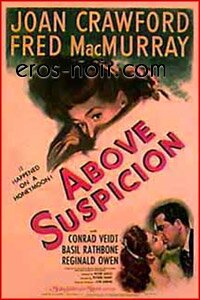|
Joan Crawford was all of these, and more.
Who could forget Faye Dunaway's over-the-top performance as Crawford in Mommie Dearest, screaming at her daughter Christine about wire hangers or flinging her to the floor and strangling her, her eyes fixed in bitter rage?
Still, there is no denying that she epitomized that standard of stardom and glamour in the public eye. She had a smoldering gaze, and audiences couldn't take their eyes off of her. Neither could the many men who were pulled into her world, at once chaotic and single-minded.
 For she was a fiery bitch with a withering wit, and made no apologies for it. She took pride in it. It defined her and set her apart from other female stars of her time, for whom she felt little empathy. For she was a fiery bitch with a withering wit, and made no apologies for it. She took pride in it. It defined her and set her apart from other female stars of her time, for whom she felt little empathy.
"Take away the pop eyes, the cigarette, and those funny clipped words, and what have you got? She's phony, but I guess the public likes that," she said of her Oscar-winning rival and Whatever Happened to Baby Jane? co-star, Bette Davis.
Was Davis right when she portrayed Crawford as a prima donna long on moxie but short on talent?
Possibly. And if so, all the more of a wonder, as she proved these were no obstacle to getting what she wanted —fame, fortune, notoriety.
She wasn't the most lauded or accomplished actress of her time, but Crawford did manage to snag an Oscar for her role in Mildred Pierce in 1945. According to rumor, the idea that she might lose so maddened her that she stayed home during the awards ceremony, feigning illness.
It was her 1940s femme fatale era that most left its mark on the pop culture landscape. As a troubled figure herself, it was not hard for Crawford to draw upon her own well of bitterness to play sharp-tongued harpies, or women whose darkness would bubble just below the surface before exploding into rage. It is here where Crawford was best in her element, and these are the roles by which she's best remembered.
Eventually, though, her career would be swallowed up by the same darkness which would haunt her personal life. By the time she appeared in 1969's abysmal Trog, her looks had faded and her star was tarnished, overwhelmed by her legendary bad temper and disposition.
Joan Crawford used to speak about how, unlike stars like Davis or Marilyn Monroe, she was never subject to a line of imitators vying for her throne. She used to say it was because she was impervious to imitation, that hers was a singular appeal not easily aped. And whatever you think of this flawed icon, it's hard to argue with her.
|